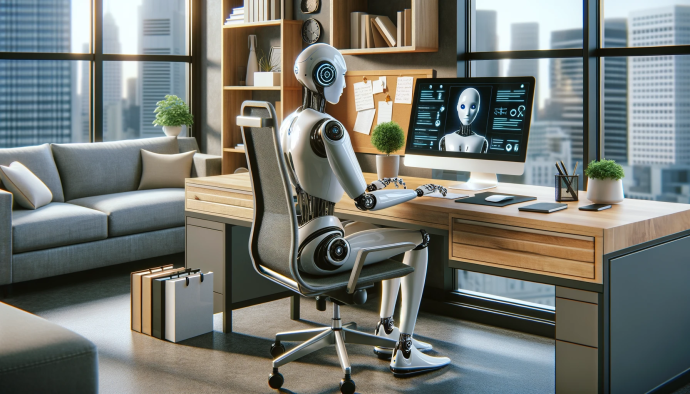Stanford Professor Claims Those Working Fully Remotely Have Greatest Risk of AI Replacement

In the unexpectedly evolving landscape of the present day place of business, the rise of artificial intelligence (AI) stands as a pivotal force, reshaping the dynamics of hard work and employment. This article delves into a urgent and fairly paradoxical phenomenon of our times: even as faraway paintings has burgeoned, providing exceptional flexibility and work-life balance, it inadvertently positions those workers at the leading edge of AI-pushed displacement.
These days, it is crucial to explore the nuances of how AI technologies are increasingly sophisticated in executing tasks traditionally finished with the aid of remote employees. It brings to mild the intricate stability between the convenience of faraway work and the looming threat of automation. As AI continues to develop, the once-celebrated domain of remote work, frequently lauded for its performance and fee-effectiveness, now stands at a crossroads.
Through expert insights, actual-world examples, and analytical foresight, the object ambitions to provide a complete know-how of this vital issue. It seeks to reply urgent questions: What makes fully remote workers particularly prone to being supplanted with the aid of AI? How are industries adapting to this shift, and what techniques can far off workers rent to shield their roles? As we undertaking further right into a future where AI's position is ever-increasing, this article is a need to-read for remote workers, employers, and all people intrigued by the evolving interplay among human exertions and artificial intelligence.
Change Is Coming

Employees who work remotely full-time may soon face a new challenge beyond retaining their work-from-home benefits: safeguarding their jobs from artificial intelligence (AI). Nicholas Bloom, a Stanford University economics professor specializing in remote work, warns that those not working in an office could lose their jobs to AI. Bloom suggests that roles requiring occasional in-person interaction, such as monthly management or mentoring meetings, are less susceptible to AI replacement.
Bloom's research indicates that fully remote workers constitute 10% of the workforce in America and Northern Europe. Jobs that are permanently remote and repetitive, like data entry or call center roles, are particularly vulnerable to AI replacement within the next five to ten years. However, it's unlikely that AI will physically replace in-person workers due to practical limitations.
Interestingly, AI could enhance the productivity of hybrid workers—those splitting time between home and office—who represent 30% of the workforce in the same regions. For these workers, AI is seen as a supportive tool rather than a threat.
The global workforce faces ongoing debates about the extent of AI automation, especially with tools like OpenAI's ChatGPT making waves. Goldman Sachs' study predicts «significant disruption» in the workforce from AI, possibly affecting 300 million full-time jobs worldwide. White-collar roles like computer hardware engineers, paralegals, accountants, and auditors, many of which are remote-compatible, are among the most exposed to AI, as per Pew Research Center data.
Conversely, jobs involving physical labor or specialized skills in unpredictable environments, such as repair services, hospitality, agriculture, and healthcare, are considered safer from AI replacement. Kweilin Ellingrud of McKinsey Global Institute notes that repetitive tasks in predictable environments are more prone to automation, whether by robots or generative AI.
Conclusion
In end, the upward thrust of AI presents a considerable task for the worldwide workforce, in particular for those in absolutely far flung, routine roles. Nicholas Bloom's insights emphasize the vulnerability of such jobs, with a splendid risk of AI changing obligations which are repetitive and devoid of in-character interplay.
This fashion shows a shift within the task marketplace, where roles requiring bodily presence or those in unpredictable environments are less probably to be automated. Hybrid workers, who balance office and faraway paintings, may additionally discover AI to be a beneficial tool, augmenting their productivity rather than posing a danger. This scenario underscores the need for adaptability and the improvement of abilities that AI cannot reflect.
As era keeps to adapt, the staff ought to navigate these adjustments, balancing the benefits of AI integration with the maintenance of human-centric process roles. The destiny of labor thus lies in a sensitive stability among embracing technological improvements and safeguarding the specific cost of human capabilities and interactions.

Become a part of digital history




Comments about Stanford Professor Claims Those Working Fully Remotely Have Greatest Risk of AI Replacement